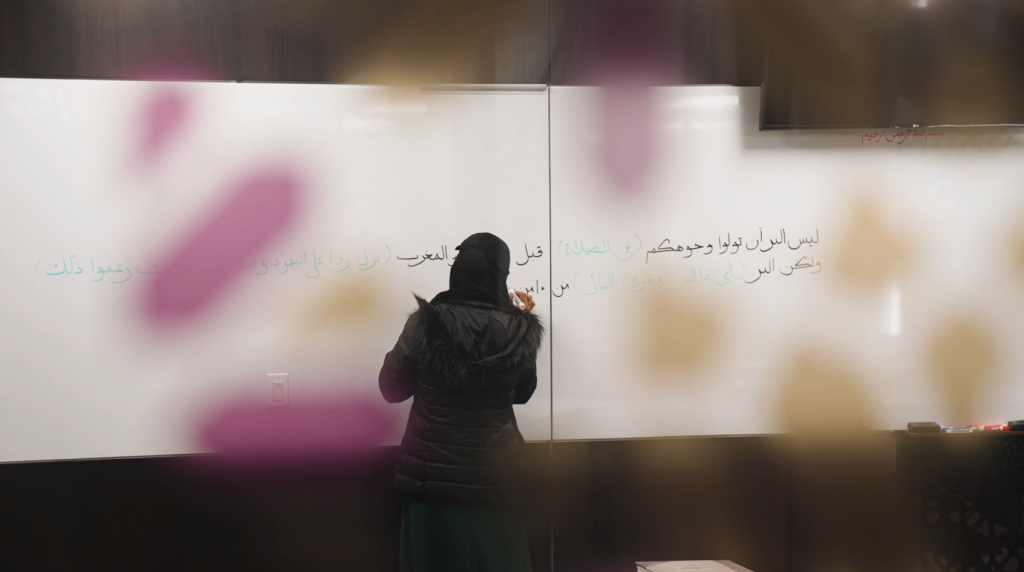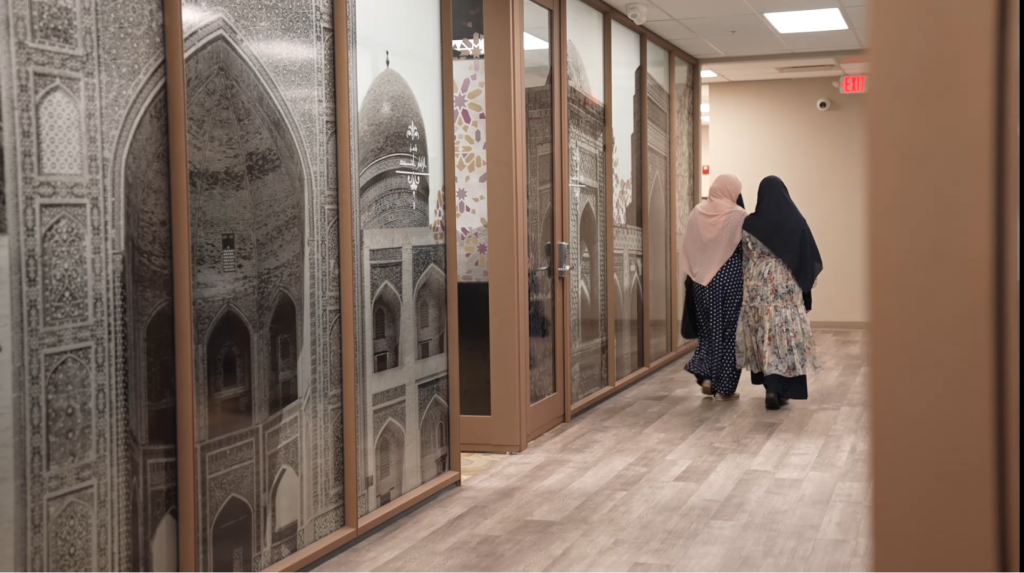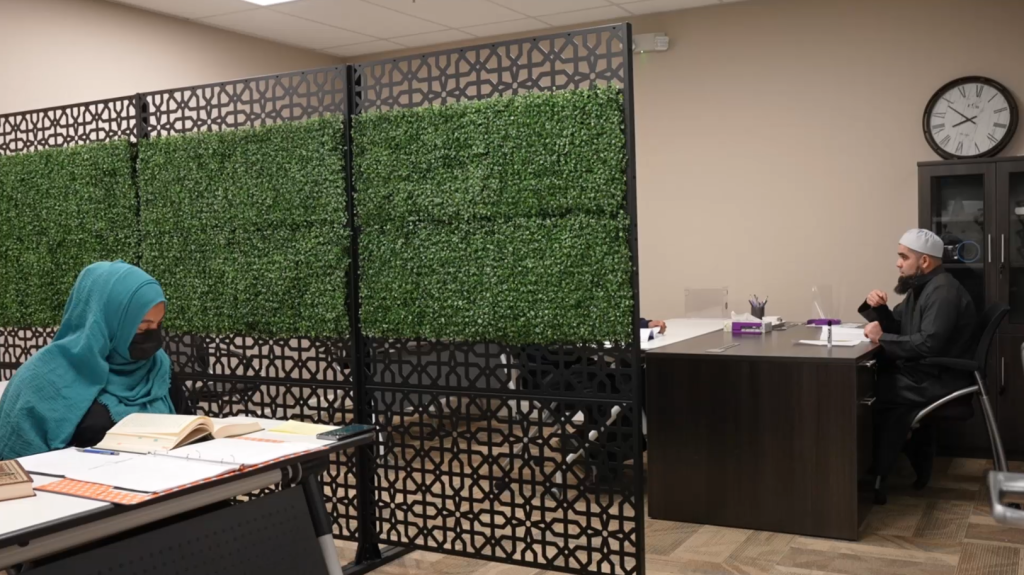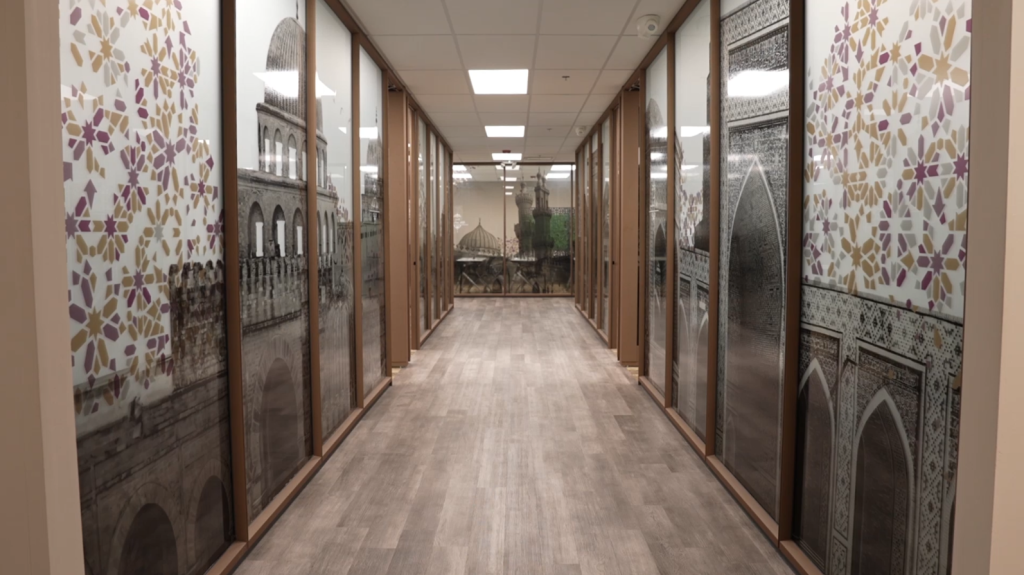
Bushra Alvi, 4th year student in the Intermediate Program, glances back at the physical gates that make up the back wall of Darul Qasim’s library. Students and faculty spent countless hours here studying traditional and contemporary Islamic texts. She is asked to reflect on how walking through the symbolic gate of knowledge, that is Darul Qasim, has transformed her. Instantly she replies,
“My experience here has been nothing short of amazing…and I would definitely do it again. […] There was so many things that I used to think, I was confused about, I wasn’t sure of…but after Darul Qasim a lot of things have been made clear to me.”
She goes on to speak about Darul Qasim’s intensive curriculum and pedagogy that is not only rigorous, but also “expands your view […] of how much there is to learn and how much there is to know.” Being at Darul Qasim has transformed her mode of inquiry and the lens through which she studies the Islamic sciences. This being a hallmark of an academic approach to studying Islam, she notes how crucial it has been in shaping not only her studies, but her worldview as well. The confusion, and what she terms “haziness” that accompanies a “believe everything you hear approach”, not only narrows one’s worldview, but also threatens one’s iman. “I wanted to strengthen my faith by clearing away all the doubts and properly try to study Islam.”
One of the many tools that Bushra has gained in this academic environment is how to approach sources. Her teachers at Darul Qasim emphasize the importance of exploring different topics or issues that arise in our contemporary world through the exploration of traditional sources. She shares,
“I would just believe everything. […] I didn’t know where a woman stood in Islam, I just believed everything I heard. […] You have to fact check, you to check the sources. […] Here we reference so many books, alongside the one I’m studying.”
She goes on to talk about the dangers of blindly following what one is told. Darul Qasim allowed her to go beyond this mindset and way of being. It transformed her sense of self and most importantly strengthened her faith by clearing away all doubts. 
Bushra’s Quest for More
For Bushra, the quest for knowledge is not something new. Her mother played a crucial role in teaching her and her sisters the basics, as well as planting the seed to seek more knowledge. At a young age, she was exposed to many circles of knowledge in her hometown in Texas. She was always surrounded by people who wanted to learn more and this had a great influence on her own journey. “I desperately wanted to learn what the truth was myself, so I applied to various madrassahs all over America, in England, and even in Pakistan.” It was five years later that she found out about Darul Qasim and decided to apply. “I never knew anyone in Chicago, but suddenly in just two weeks, I found a place to live, a couple of roommates, and a job Alḥamdulillāh!”
Like other students at Darul Qasim, she talks about the importance of intention, but adds to that the need for tawwakul (reliance; trust) as well. Walking through the gate of knowledge requires a firmly rooted trust in Allah ﷻ. Bushra reflects on having tawwakul and the transformation of self that has occurred during her studies at Darul Qasim:
“It has strengthened me in terms of having trust in Allah ﷻ. It has taught me that Allah’s ﷻ plan is the best plan, and we just have to wait for the right time He ﷻ decides. This fact itself has made me a much more calm person (I hope) when it comes to obstacles that I face.”
 Being out of state and completely on her own for the first time in her life was a struggle in and of itself for Bushra. She recollects the first two years were the hardest for her. The most notable struggle was not having a mode of transportation. “I was unable to get groceries or even come home from school at times. Alḥamdulillāh, in my third year here, I finally got a car.”
Being out of state and completely on her own for the first time in her life was a struggle in and of itself for Bushra. She recollects the first two years were the hardest for her. The most notable struggle was not having a mode of transportation. “I was unable to get groceries or even come home from school at times. Alḥamdulillāh, in my third year here, I finally got a car.”
Telling the Story of Darul Qasim
Bushra’s telling of the story of Darul Qasim showcases a female student that has found faith, clarity, and a stronger sense of self walking through the gate of knowledge. She shares her story with humility and strength. Her voice is heard in community with the faculty and students that walk the halls of Darul Qasim. We asked Bushra why it is important to tell this story? She offered:
“ So people would understand how Islamic sciences are academic and not something that’s a waste of time, as is the belief of many, unfortunately. Darul Qasim is proof that studying Islam is not an extra-curricular, but a sacred science on its own with a high level of importance and esteem, the same way the people view the secular sciences.”
